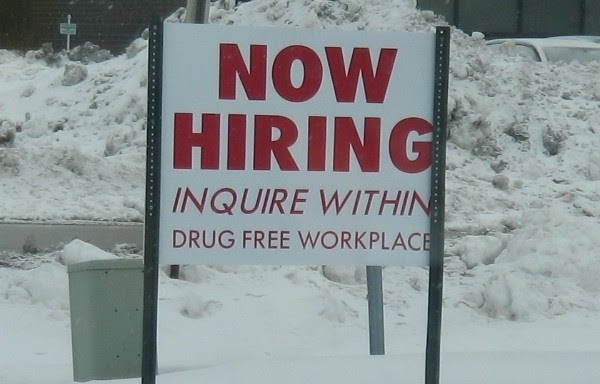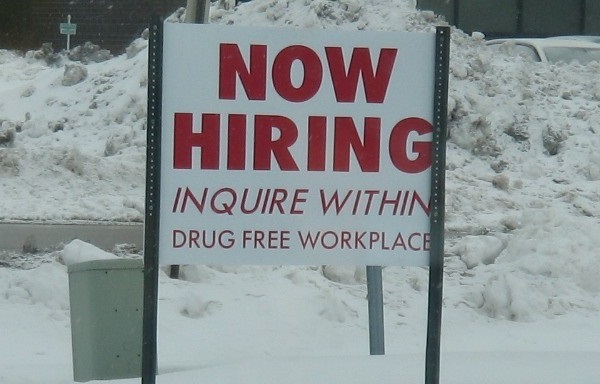In This Article
- Oklahoma's Employment Laws for Medical Marijuana Patients
- You Must Have an Oklahoma MMJ Card to Get These Protections
- Most Federal Employees Aren't Protected
- What are Oklahoma's Safety Sensitive Jobs?
- Drug Testing Employees for Medical Marijuana in Oklahoma
- What About Oklahoma's Federal Drug-Free Workplaces?
- Can MMJ Patients be Fired in Oklahoma?
- Getting a Job with a Medical Marijuana Card in Oklahoma
Legal Disclaimer: This article is provided for informational purposes only. It was not written by an attorney. Although every reasonable effort is made to present current and accurate information, NuggMD and all authors make no guarantees of any kind and cannot be held responsible or liable for any outdated or incorrect information. The information contained herein is not provided in the course of and does not create or constitute an attorney-client relationship, is not intended to convey or constitute legal or regulatory advice, an interpretation of law, an advisory opinion or rulemaking of any kind, and is neither a substitute for nor does it release you from your responsibility to review applicable law and, if necessary, obtain legal advice from a qualified attorney.

As of 2022, Oklahomans have the right to obtain a medical marijuana license after receiving a recommendation from their physician. However, some may be wondering what this means for their workplaces. Many employees in Oklahoma know that if they test positive for marijuana (or any illicit drug, for that matter), they could get fired.
But MMJ is legal now in Oklahoma. So what does this mean for employees and employers in The Sooner State?
As a result of the Oklahoma Medical Marijuana and Patient Protection Act, Oklahomans with MMJ licenses have specific protections against adverse employment actions. But these workplace protections only apply to jobs that are not classified as "safety-sensitive."
Normally, getting a medical marijuana card in Oklahoma shouldn't affect your job. But, before you send in your application, make sure you're not in one of these "safety-sensitive" job positions. Otherwise, you could have to make a choice between your job or your medical marijuana license.
Oklahoma's Employment Laws for Medical Marijuana Patients
Thanks to the Oklahoma House Bill 2612, also known as the Oklahoma Medical Marijuana and Patient Protection Act, medical marijuana patients have significant protections against disciplinary actions by their employers. However, the Oklahoma legislature included provisions in the bill that outline exceptions to these protections.
Employers are exempt from HB 2612's protections if the employment in question is designated as a "safety-sensitive" job. These types of jobs are those involving "tasks or duties that the employer reasonably believes could affect the safety and health of the employee performing the task or others." A firefighter, police officer, or a pharmacist are good examples of safety-sensitive jobs.
But MMJ patients that are not employed in such positions can rely on strong protections. They shouldn't face any employment discrimination in hiring, firing, disciplining, or other penalties due to their medical marijuana use. This doesn't mean employees can use medical marijuana during work hours, or show up to the workplace with it in their possession or under its influence. They are only free to use their medical marijuana in their private time -- as long as they follow all other applicable Oklahoma cannabis laws and regulations.
You Must Have an Oklahoma MMJ Card to Get These Protections
Another important thing to keep in mind: these protections only apply to employees with valid medical marijuana licenses. Unlicensed employees who test positive for marijuana will still face adverse employment actions against them by their employer.
Under Oklahoma law, businesses are entirely within their rights to terminate or take other disciplinary steps against non-licensed employees who test positive for marijuana or its components.
Most Federal Employees Aren't Protected
There is another important exception to these medical marijuana employment protections in Oklahoma.
Many federal workplaces are required to comply with federal drug free workplace requirements. These employees must abide by the federal requirements even if they're legal MMJ patients. This is because marijuana is still federally illegal.
The two most common examples of positions that are subject to federal drug free workplace requirements are employees of federal or government agencies and employees whose employer relies on federal grants.
While HB 2612 has given employees significant workplace protections, it doesn't remove a businesses' legal right to conduct drug tests for marijuana, as long as its policies follow the Oklahoma Standards for Workplace Drug and Alcohol Testing Act.
This means that an employer can still request a drug test whether or not you have a medical marijuana license. The House bill also does not give patients the right to seek reimbursement from their employer, private insurance, or related government programs for their MMJ related costs.
What are Oklahoma's Safety Sensitive Jobs?
As we mentioned, certain "safety-sensitive" employers do not necessarily have to comply with the protections of HB 2612. According to the House Bill, safety-sensitive jobs are defined as:
"a. the handling, packaging, processing, storage, disposal or transport of hazardous materials,
b. operating a motor vehicle, other vehicle, equipment, machinery or power tools,
c. repairing, maintaining or monitoring the performance/operation of any equipment, machinery or manufacturing process, the malfunction or disruption of which could result in injury or property damage,
d. performing firefighting duties,
e. the operation, maintenance or oversight of critical services and infrastructure including, but not limited to, electric, gas, and water utilities, power generation or distribution,
f. the extraction, compression, processing, manufacturing, handling, packaging, storage, disposal, treatment or transport of potentially volatile, flammable, combustible materials, elements, chemicals or any other highly regulated component,
g. dispensing pharmaceuticals,
h. carrying a firearm, or
i. direct patient care or direct child care;"
Therefore, positions such as chemical plant workers, firefighters, pharmacists, or forklift operators are not eligible for the Oklahoma's medical marijuana patient employee protections. What about healthcare workers? For example, can nurses in Oklahoma get a medical marijuana card? Unfortunately, no. Nurses are involved with direct patient care, and are, considered safety-sensitive workers.
Workers employed by the state of Oklahoma are included in HB 2612's employment protections as long as the job position does not fall under the guidelines for safety-sensitive jobs. However, according to the law, some state employees are barred from receiving a medical marijuana license, and thus the employment protections. These include sheriffs, deputy sheriffs, police officers, prosecuting officers, or officers/employees of the Oklahoma Medical Marijuana Authority or the municipality issuing the medical marijuana license.
Drug Testing Employees for Medical Marijuana in Oklahoma
While non-safety-sensitive workers can rely on significant employment protections thanks to the Oklahoma Medical Marijuana and Patient Protection Act, the bill doesn't prevent employers from enacting drug testing policies in their workplaces, even for those with valid medical marijuana licenses.
When applying for jobs, medical marijuana patients may still be subject to pre-employment drug screenings, and these screenings could continue after they get the job. Though, these drug policies still must comply with the Oklahoma Standards for Workplace Drug and Alcohol Testing Act. Any willful violations of these drug screening standards by the employer will be rectified according to that law.
An employer can make any of their MMJ patient employees take a marijuana drug test. But, as long as employees have a valid medical marijuana license issued by the Oklahoma Medical Marijuana Authority, they should have nothing to worry about. That is, as long as they're using medical marijuana during non-working hours, and not showing up to work while under the influence.
The HB 2612 explicitly states that businesses retain the right to fire or discipline any and all employees that possess or are under the influence of marijuana while in the workplace.
What About Oklahoma's Federal Drug-Free Workplaces?
Along with those in "safety-sensitive" positions, certain federally regulated or governmental jobs are excluded from Oklahoma's medical marijuana protections. The U.S. federal government still considers marijuana a Schedule 1 illicit substance.
Unsurprisingly, many job positions in federal government agencies are performed in "drug-free workplaces." Therefore, employees in these workplaces must strictly comply with federal marijuana regulations. Medical marijuana patients in these positions do not have any protections against being fired if they use marijuana at any time, including during their off-time.
Also, employers for any company, business, or organization that receives federal funding cannot receive a medical marijuana prescription. Such companies must designate their workplace as "drug-free" to be eligible for funding. For example, public schools receive federal funding and are subject to drug-free workplace laws. As a result, school teachers are not able to use medical marijuana.
These aren't the only jobs with such constraints. Police officers, sheriffs, deputy sheriffs, and agents of the Oklahoma Medical Marijuana Authority are barred from obtaining a medical marijuana license, and, by extension, the subsequent employment protections.
Can MMJ Patients be Fired in Oklahoma?
A very typical, yet understandable question that many patients ask: can I get fired for medical marijuana in Oklahoma?
Ultimately, it all depends on the individual circumstances, but normally, no. As long as a medical marijuana patient is not employed in a job that isn't legally eligible for MMJ use (police officer, safety-sensitive positions, employee in a federal workplace), they shouldn't be fired for using medical marijuana during non-working hours.
However, that doesn't mean it can't happen. If you were to show up to work with medical marijuana in your pocket, or if you use it in the workplace, then you could be fired, with or without an OK medical card. Also, if you don't have a valid medical marijuana license, you are not included in the employment protections, as recreational marijuana is not legal in the state of Oklahoma.
Getting a Job with a Medical Marijuana Card in Oklahoma
Getting a job in Oklahoma with a medical marijuana card shouldn't be any different than it otherwise would be. In many instances, you would still be required to take a pre-employment drug screening. And, as we mentioned before, some jobs can't legally be held by those with medical marijuana licenses.
RELATED READ: How to Detox from Weed
But you don't need to worry about a potentially positive marijuana test as long as you're not applying for a federally regulated, law enforcement, governmental, or a safety-sensitive job such as a nurse, child care worker, heavy machine operator, or hazardous materials technician. As long as your medical marijuana license is valid, a positive test should not influence your chances of getting a job.
If you do think you've been improperly discriminated against because of your drug test results or status as a medical marijuana patient, you should speak to an attorney to explore your options.
Also, not every job opportunity in Oklahoma will require pre-employment drug screening. In fact, there are plenty of positions with companies that don't drug test, as long as you know where to look.
The information in this article and any included images or charts are for educational purposes only. This information is neither a substitute for, nor does it replace, professional legal advice or medical advice, diagnosis, or treatment. If you have any concerns or questions about laws, regulations, or your health, you should always consult with an attorney, physician or other licensed professional.




